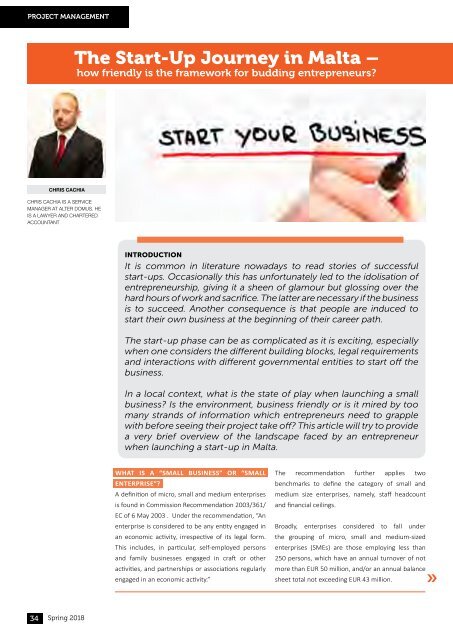ACCSPRING18_ONLINEVER
You also want an ePaper? Increase the reach of your titles
YUMPU automatically turns print PDFs into web optimized ePapers that Google loves.
PROJECT MANAGEMENT<br />
The Start-Up Journey in Malta –<br />
how friendly is the framework for budding entrepreneurs?<br />
CHRIS CACHIA<br />
CHRIS CACHIA IS A SERVICE<br />
MANAGER AT ALTER DOMUS. HE<br />
IS A LAWYER AND CHARTERED<br />
ACCOUNTANT<br />
INTRODUCTION<br />
It is common in literature nowadays to read stories of successful<br />
start-ups. Occasionally this has unfortunately led to the idolisation of<br />
entrepreneurship, giving it a sheen of glamour but glossing over the<br />
hard hours of work and sacrifice. The latter are necessary if the business<br />
is to succeed. Another consequence is that people are induced to<br />
start their own business at the beginning of their career path.<br />
The start-up phase can be as complicated as it is exciting, especially<br />
when one considers the different building blocks, legal requirements<br />
and interactions with different governmental entities to start off the<br />
business.<br />
In a local context, what is the state of play when launching a small<br />
business? Is the environment, business friendly or is it mired by too<br />
many strands of information which entrepreneurs need to grapple<br />
with before seeing their project take off? This article will try to provide<br />
a very brief overview of the landscape faced by an entrepreneur<br />
when launching a start-up in Malta.<br />
WHAT IS A “SMALL BUSINESS” OR “SMALL<br />
ENTERPRISE”?<br />
A definition of micro, small and medium enterprises<br />
is found in Commission Recommendation 2003/361/<br />
EC of 6 May 2003 . Under the recommendation, “An<br />
enterprise is considered to be any entity engaged in<br />
an economic activity, irrespective of its legal form.<br />
This includes, in particular, self-employed persons<br />
and family businesses engaged in craft or other<br />
activities, and partnerships or associations regularly<br />
engaged in an economic activity.”<br />
The recommendation further applies two<br />
benchmarks to define the category of small and<br />
medium size enterprises, namely, staff headcount<br />
and financial ceilings.<br />
Broadly, enterprises considered to fall under<br />
the grouping of micro, small and medium-sized<br />
enterprises (SMEs) are those employing less than<br />
250 persons, which have an annual turnover of not<br />
more than EUR 50 million, and/or an annual balance<br />
sheet total not exceeding EUR 43 million.<br />
34 Spring 2018

















